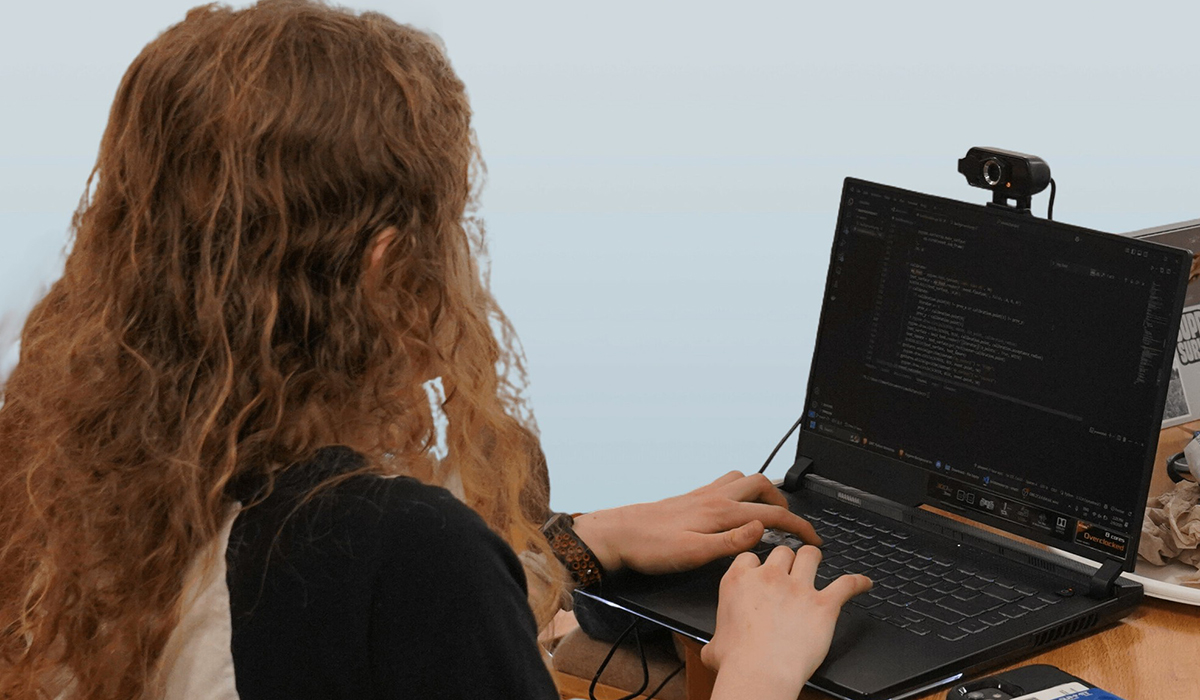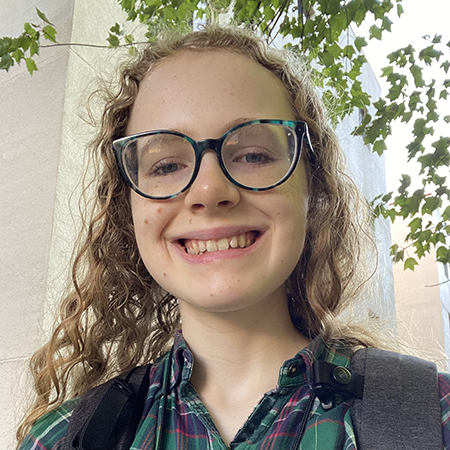High Tech Help for Mental Health

Meet Daily Point of Light Award honoree Emme McDonald. Read her story, and nominate an outstanding volunteer or family as a Daily Point of Light.
For some people, there’s never enough time in the day to participate in their passion for the hours it could engage them. Emme McDonald is one of those people, and her passion is programming. She fell in love after an introductory computer science class in elementary school but has garnered the bulk of her knowledge from online resources in her spare time. She often tests her skills by competing in hackathons and coding personal projects like websites and games.
Last November, she began using those skills for mercuri.world, an organization addressing global mental wellbeing using digital solutions, and is currently the director of app development. Emme’s work building innovative tools and maintaining a multilingual resource library empowers people to be proactive about their mental health. CareerQuest, a highly technical project using machine learning to match users with jobs that offer various accommodations, helps people find employment that fits their needs and will be the first of its kind.
Emme volunteers an average of 30 to 60 hours a month and leads a team of around 10 programmers across time zones. Middle-of-the-night meetings with colleagues in India and Nepal have only made her more appreciative of her role and the community she has built around the world. It is a community she hopes to expand even further as she applies to bachelor’s programs in computer science. After all, who says passion projects are just for after work?
What inspires you to volunteer?
Service is one of the most rewarding things you do. Someone from my school recommended mercuri.world. I was intrigued by their mission, so I applied right away. It was nice to find a place where I could put my programming skills to work in a way that would help people.

Tell us about your volunteer role with mercuri.world.
I’m the lead developer. At first, I was on the mobile app development team, then I transitioned to web development. Now, I head up most of the organization’s tech projects. I code and maintain our main websites. That involves making new, exciting tools to make mental health resources more accessible like our online library of multilingual options, which is constantly being updated and expanded.
My main focus is coding CareerQuest, software that connects people with mental health conditions to job opportunities that can provide accommodations. Users fill out a profile of how many hours they would prefer to work, accommodations they’ll need and stuff like that. We store that away from personally identifiable information. Then, we can train an AI model on their needs and job data that we find online to generate a compatibility score out of 100. Higher scores are recommended to the user. We had an initial pilot, and it’s been really special to see anecdotes and feedback.
Where do you see the use of AI being beneficial to mental health in the future?
Our director of AI is working on using AI to help translate mental health resources that aren’t accessible in many languages. I think that will be really helpful in the future. And also, things like machine learning models that can help match people to jobs they need. I think there’s a lot of promise in the field to make things more accessible to people, no matter what location they’re in or language they speak.
What’s been the most rewarding part of your work?
I love knowing that the tools I make are helping people in such a unique way. And it’s been really rewarding to be a part of the community of people I’ve met volunteering. I’ve made a lot of great connections all around the world.
What have you learned through your experiences as a volunteer?
For everything, but especially with coding, the best way to learn is by doing. Working on large-scale projects for mercuri.world has taught me so much about web development and programming best practices. Beyond hard skills, I’ve also learned about communication and how teamwork can combine new perspectives and skillsets to make something incredible.
Do you have any tips for either people dealing with mental health issues, or for employers trying to make roles more accessible?
For employers, the biggest thing we’ve seen is having access to quiet spaces where there is less sensory overload and having flexibility to take days off for mental health. For individuals living with mental health challenges, the most important thing is to build a support system for yourself. It can be hard, depending on your situation, but that’s where online resources can really help.
We also have a program called Little Talks that encourages people to connect with each other over social media in a genuine way and check in on people who might be struggling. Community building, whether in-person or online, is really helpful.
Why is it important for others to get involved with causes they care about?
One person can make a huge difference, whether it’s to one person or 1,000. And by getting involved with a cause you’re passionate about, you learn and grow while allowing others you meet to do the same. It’s an exchange of ideas, experience and compassion, and it’s one of the most worthwhile things you can do.
What do you want people to learn from your story?
Don’t be afraid to put yourself out there. Everyone has their own unique skill set, and you can do a lot with it. Programming might not be the first thing someone thinks of when they think about community service, but it can make a huge difference. You can do a lot more than you think you can, and your community will be grateful for it.
Do you want to make a difference in your community like Emme? Find local volunteer opportunities.